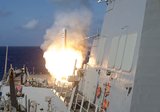Brazil's strike chaos stirs military coup talk
The Brazilian Army is often called to help when things go wrong, so it was no surprise to see soldiers deploy during a crippling truckers' strike. The difference this time: loud calls for the military to take over the country altogether.
Truckers launched their action 10 days ago, gumming up the food and fuel supply system across Latin America's biggest economy.
Their protest began over rising fuel prices. However, public backing for the shutdown indicated much wider discontent at Brazil's floundering economy, unpopular government and rampant corruption.
In response, centre-right President Michel Temer ordered the army to escort non-striking trucks safely past picket lines.
But far from being angry at the arrival of troops, a number of strikers greeted them with banners reading: ‘Intervention now!’
‘Intervencao ja!’ as it goes in Portuguese, is shorthand for a return to the military dictatorship that ruled here between 1964-1985, or at least a coup, followed by new elections.
The slogan appears periodically on the fringes of mainstream anti-government rallies.
Now, though, it took centre stage during national media coverage, with drivers unafraid to voice support for a takeover.
Alexandre Bastos, who was taking part in a truckers' blockade of a refinery outside Rio de Janeiro, told AFP: ‘We want military intervention, if possible, to sort out this country. Intervention would have nothing to do with dictatorship. We just want the army to intervene.’
There was even a fake news rumour spread on WhatsApp that the constitution required military intervention once the strike lasted seven working days and six hours, which would have meant on 29 May.
The supposed deadline came and went. But all of a sudden this normally toxic subject had become that much more mainstream.
Reserve Army General Augusto Heleno told Folha de S.Paulo newspaper on 30 May: ‘It's a feeling that is growing in the population, which sees the military as the solution to the nation's problems.’
Heleno, who commanded UN peacekeepers in Haiti, insisted that the armed forces ‘do not intend, do not seek’ a coup.
But he then went on to praise the dictatorship's image of ‘a more organised country, where people had a better life.’
Heleno said: ‘I'm not saying it was like that. But this is the image a lot of people have.’
Brazilians have got used to seeing the military step in where other institutions fail.
Residents of Rio de Janeiro no longer bat an eyelid at the sight of soldiers in full battle dress. During the 2016 Rio Olympics and again, starting in 2017, soldiers regularly deployed everywhere from Copacabana beach to the chaotic, violent favelas where drug gangs rule.
A government decree in 2018 went a step further, putting generals in charge of Rio's police, firefighters and other emergency services, citing the regular leaders' failure to control crime.
It is not just bringing law and order, either.
When Brazil was in the midst of a Zika crisis in 2016, with the Olympics coming, it was the military that again came to the rescue, going house to house to eradicate mosquitoes in at-risk areas.
The military's sterling reputation is a big part of the presidential campaign for former Army Captain Jair Bolsonaro, a frontrunner in the October 2018 polls.
Although Bolsonaro often expresses nostalgia for the dictatorship, he declined to support the truckers demanding intervention, saying that the right wing should come to power through the ballot box, rather than being told ‘there was a coup.’
Still, even if coup talk is mostly hot air, the subject was worrying enough to prompt Supreme Court Chief Justice Carmen Lucia on 30 May to pronounce: ‘Democracy is the sole legitimate path.’
Temer's Institutional Security Minister Sergio Etchegoyen also sought to reassure Brazilians.
He said: ‘Military intervention is a topic from last century.’
More from Defence Notes
-
![US lawmakers warn that “more military spending is absolutely necessary” to ensure Pentagon’s readiness]()
US lawmakers warn that “more military spending is absolutely necessary” to ensure Pentagon’s readiness
The US Congress has raised concerns about how inflation rates and cuts in main acquisition programmes could affect the US military.
-
![Can the US overcome Russian and Chinese nuclear capabilities?]()
Can the US overcome Russian and Chinese nuclear capabilities?
Washington’s ageing inventory and the pace Moscow and Beijing have been modernising their capabilities put in check the US Nuclear deterrence.
-
![US FY2024 funding package passes as China closes military capability gap]()
US FY2024 funding package passes as China closes military capability gap
The Pentagon has been operating under temporary funding since October 2023, which has impacted its main acquisition and development programmes, increasing the capability gap between the US and China.
-
![NATO outlines future challenges as Ukrainian funding from US stalls]()
NATO outlines future challenges as Ukrainian funding from US stalls
In 2023, defence spending increased by an unprecedented 11% across European NATO countries and Canada. Since 2014, the group has spent an additional US$600 billion on defence.
-
![US Pentagon to reduce investments in main acquisition programmes over FY2025]()
US Pentagon to reduce investments in main acquisition programmes over FY2025
The DoD requested nearly US$850 billion to fund operations over the next fiscal year. Despite the amount being 1% higher than the FY2024 budget request, it has not covered the 3% inflation rate, which could impact the DoD’s main programmes in the medium and long term.























